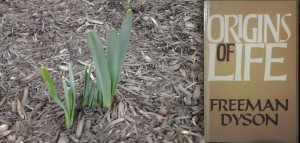ELSI Blog
50 Some Thoughts on the History of Origins of Life Research

Despite our best efforts, almost certainly most of what we presently believe about the origin of life will one day seem quaint, outdated and just plain wrong. Over time, most of the scientific community's leading models for the origin of life have changed, after a slight lag, with discoveries in other scientific fields of inquiry. For example the "RNA World" model sprung up in the wake of the elucidation of the Central Dogma of biology in the 1960′s; and "vent" models came on the scene soon after the discovery of submarine hydrothermal ecosystems in the late 1970′s. Leaving aside the way we now think about Alexander Oparin's coacervates, Sidney Fox's proteinoid microspheres, or Miller-Urey electric discharge experiments for another discussion, ideas we get excited about crash and burn regularly in science, sometimes to be reborn later from the ashes. Like biological organisms themselves, new origin-of-life models are continually devised, tested and shelved or left battered but intact, and sometimes stronger in their new context. I expect this process will continue for some time in both the realms of theory and actual biology.
On the way back home from an early spring walk Rock Creek Park last Sunday, I noticed buds on the tips of tree branches and tulip-shoots peeking out from the only-yesterday snow-covered ground. With nowhere in particular to be, I stopped off at our local public library, up Connecticut Avenue in Cleveland Park.
Among the many services offered by the library, it also sells used books at truly bargain-basement prices. The downside, or upside, depending on one's perspective, of course, being that one never knows exactly what's going to be on the shelves.
This being Washington, DC, there's always the potpourri of political commentary and not-quite-history-yet analysis of recent global events: works by Bob Woodward and Thomas Friedman, and various book-length essays on why Democrats or Republicans "have it all wrong". Then there are the odd cookbooks: the Regional Cuisines of Australia, Cooking with Cheese, etc., a nice collection of classics in paperback: To Kill a Mockingbird, Moby Dick (for 50¢! You can't even buy a pack of gum for 50¢ anymore, let alone the finest work of American fiction), a couple of Shakespeare plays, some science fiction, some young adult lit. But if one has the patience to scan spines, there's always the rare gem. Today, literally 60 seconds before closing time, I found one: Freeman Dyson's 1985 Origins of Life.
I slipped a dollar in the donation slot (it's a hard cover) and walked out with this small volume in my pocket, then the librarian locked the doors behind me.
I already own a copy of Origins of Life, it's in a bookcase somewhere in my living room. I read it 15 years ago or so, but I was thinking of a colleague or two at ELSI who might enjoy it. Being at the Institute for Advanced Study now, also, I have finally had the pleasure to meet Freeman Dyson in person, so the book has a new context and meaning for me. The model for the origin of life discussed in the book is at least 29 years old: this model may be instructive, it may be misleading; but it holds up pretty well after weathering 29 years of scrutiny.
As I walked down the street, I began to leaf through Origins of Life, and found this lovely passage in the summary chapter, where, having presented his model for the origins of life over the course of the book, Dyson asks himself a series of questions regarding his model. The last of these is:
"What will happen to my little toy model when the problem of the origin of life is finally solved?
This is the last question raised by the model and it is easily answered. The answer was given nearly two hundred years ago by my favourite poet, William Blake (A Vision of the Last Judgment, Rossetti MS 1810):
To be an Error and to be Cast out
is a part of God's design."
I don't know whether Blake thought, or Dyson thinks, there is a God, or what it's like if it (It?) exists, but the notion of the quote, suggesting selection in all things, rings true regardless.











